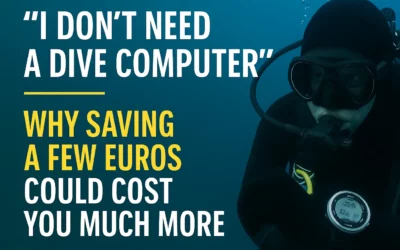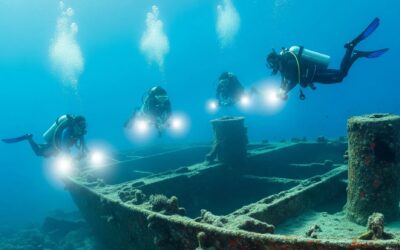We explain our students that diving is like shopping. While shopping we pass by the stores slowly, looking at each shop window and stopping to see every piece of clothing that catches our attention. Underwater it is similar. We must swim very slowly, look at every single hole, underneath each rock and investigate which beautiful creatures are hiding there. That is the best way to be able to enjoy all the wonders of the underwater world.
Most divers totally agree with this comparison. But in reality, do we all swim in a slow manner? Did it ever occur to you that you felt you lost sight of your guide or buddy while not kicking with your fins for just a short sequence?
Being honest, diving slowly is one of the most forgotten skills of our beloved sport. Fast swimming is spreading through the diving industry. Professionals, experienced divers and newcomers, all of them, seem to have forgotten that we should leave the stress on the surface and be able to enjoy a moment of tranquillity, silence and magic wonders underwater.
Being a technical diver does not mean to go 150m (500ft) deep on your first day. Not even in your first year. Technical divers are made, not born. It is a path that begins with a first course. With experience and new training, you will go along that path.
We have been thinking a lot about the answer and the truth is, we struggle to find any advantages. We do not say that in special circumstances we do not have to swim fast, but as for a normal dive, there are no reasons that validate fast swimming as a good option.
1 – Do we go further? No. Well, in theory, when swimming faster it would be logical to think that we can visit more parts of the reef. But in practice, a fast swimming diver increases drastically his/her air consumption. This would end up in running low on air for the fast swimmer much earlier while the relaxed one, depending on the profile, could enjoy the dive for anther decade. Just because of swimming slowly and breathing in a calm pattern a diver could stay longer underwater and reach further spots.
2 – Does it get you in shape? Yes. That’s for sure. But to get in shape you go to the gym. Diving should be many things, but not a method to get fit.
3 – Wouldn’t you see big stuff longer? Well, this is a difficult one to answer. We all know this moment of swimming fast just to stay beside a whaleshark or other fantastic animals. The truth is, there are particular cases in which we all decide to swim fast. But as a general rule, a fast approach to any animal might be threatening for them (do not miss 7 tips to approach and remain near the fish) and therefore it ends up being counterproductive.
1 – It affects your breathing and does not allow you to remain calm.
2 – You consume and waste much more air.
3 – It is more likely to loose your buddy.
4 – The risk of getting cramps increases.
5 – You miss a lot of life and corals hiding between rocks, covered by algae or sand.
6 – You might lose your fins.
7 – It is more likely that you run out of air due to high consumption and poor air control.
8 – You might get lost in a dive site due to speed and limited orientation.
9 – Difficulty of feeling an “against current” that doesn’t allow us to return to the exit point
10 – It increases our metabolism – higher risk of DCS!
Poor Buoyancy
Lack of buoyancy control, often caused by overweighting, induces us to swim faster. When we feel that we are going to hit the bottom, instead of breathing in or inflating the BC, we instinctively swim forward. Learn how to dramatically improve your buoyancy.
As we mentioned, bad buoyancy or diving overweighted induces us to swim fast. If unfortunately, nobody ever corrects us, over time, even though our buoyancy improves, that bad habit of swimming fast to avoid hitting the bottom becomes our “normal way to dive”. So like this we have been diving always, why should we change?
Sadly, there are experienced divers and professionals who learn to dive once and since then they already believe they know everything. They dive and dive. And they may even have thousands of dives and decades of time spent in the diving industry. But they have simply repeated 1000 times the same (wrong) action. They have never evolved. Probably they have never tried new things. Never done courses like a cave training or technical diving that push your diving skills to new limits. Or simply they haven’t learned from other divers or professionals. Sadly, there are many recreational experts and professionals who do not have the desire to improve, to learn, to surpass themselves, in short, to evolve as divers.
– Suddenly you will discover that the reef you have passed by plenty of times is full of life: No, it has always been. As you go slower, you see many more things that you have missed while speeding up.
– The other divers will prefer you as a companion / guide: In 12 years as professionals we have never -absolutely never!- heard any customer complaining or asking for a change of guide/ instructor because he/she swam too slow. On the contrary, we have often heard complaints or requests to do so because the dive leader was too fast. You will be preferred as a buddy and as a guide. Even in the most boring dive you can imagine, you will see that your clients or colleagues leave the water saying: “Ah! Very good! I enjoyed it a lot! It has been a very relaxing dive! ”
– You will drastically reduce your air consumption: As we have seen in our article … to reduce air consumption … one of the most important steps to reduce your air consumption is a calm and slow breathing pattern. If you swim fast, your metabolism increases and therefore your breathing does, too. Make the test, just for once, swim slowly, and you’ll see what happens to your air consumption!Don’t miss our tips to dramatically reduce your air consumption.
– You will discover that floating without swimming is a wonderful experience: We had a co-worker who used to mention in his briefings: “The most likely thing to happen is that we have a current coming from the southwest. If it’s not, unfortunately, we’ll have to swim!”. And it’s a beautiful way to describe that feeling. Pure weightlessness, just float! You, the fish, the corals. Surrounded by nothing else than silence, peace and tranquillity. Try it!
– You can be more aware of the environment and notice what is going on around you: By slowing down our swimming rhythm we can concentrate much more on the environment. It is about realising the problems that may arise, focusing on orientation and how to return and noticing possible hazards…
– You can enjoy special encounters with marine life better: Have you ever tried to just float? At first the fish are distrustful. But if you are patient, you will see that if you float or go very slow with very gentle movements, little by little the fish will come closer and browse around you. They will not fear you and therefore you will be able to approach them and enjoy them for a longer time.
So, if you have not tried yet to dive in slow motion, we recommend you to try it as soon as possible! You will discover that in the underwater world, the slower we move, the more wonderful it is.



